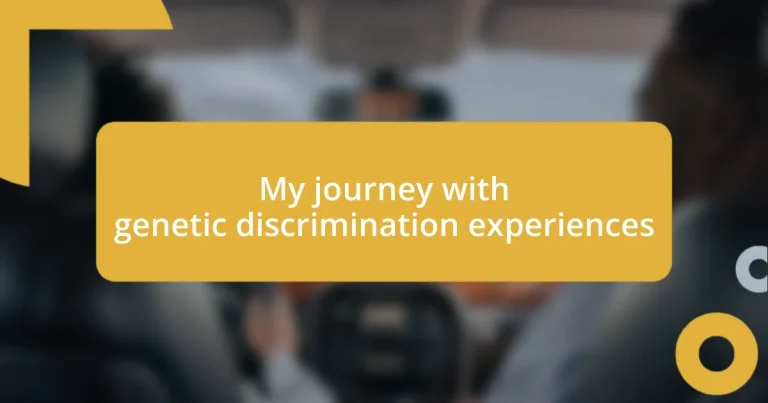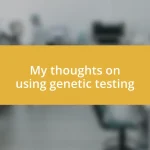Key takeaways:
- Genetic discrimination affects individuals across various sectors, leading to job insecurity, insurance challenges, and social isolation.
- Legal protections like the Genetic Information Nondiscrimination Act (GINA) exist, but gaps remain, especially regarding life and disability insurance.
- Raising awareness and providing support through community connections, education, and advocacy are crucial in combating genetic discrimination.
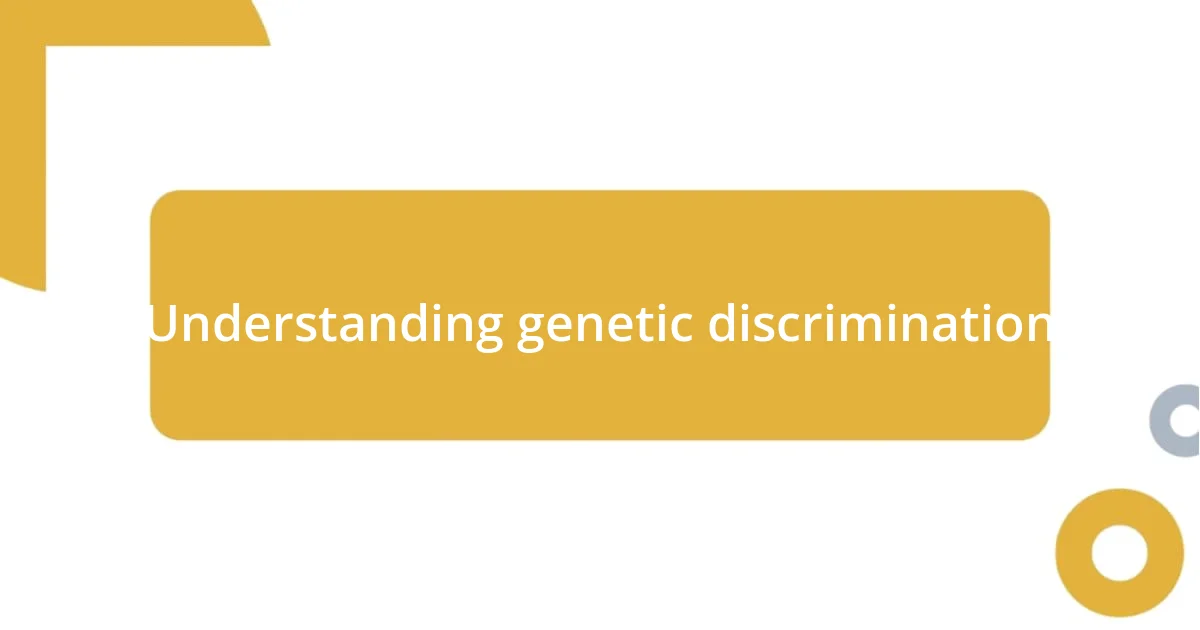
Understanding genetic discrimination
Genetic discrimination occurs when individuals are treated unfairly based on their genetic information. I remember a friend of mine who underwent genetic testing for a hereditary condition, and afterward, she struggled with anxiety about her job security. It made me wonder: how many others live in fear of revealing their genetic predispositions, risking their careers and relationships just to be honest about who they are?
What really struck me is how pervasive this issue can be in various sectors—healthcare, employment, and even insurance. I once had a conversation with a colleague whose employer denied him a promotion purely based on his family history of a certain illness, despite his outstanding performance. This made me reflect: doesn’t everyone deserve an equal chance, regardless of their genetic makeup?
Moreover, the emotional toll of being labeled because of your genes can be staggering. I’ve seen people withdraw from social circles or become consumed by their fears, simply because they were afraid of being judged. It’s a painful reality that often goes unspoken, and it’s crucial to consider how such discrimination affects not just individuals, but families and communities as a whole.
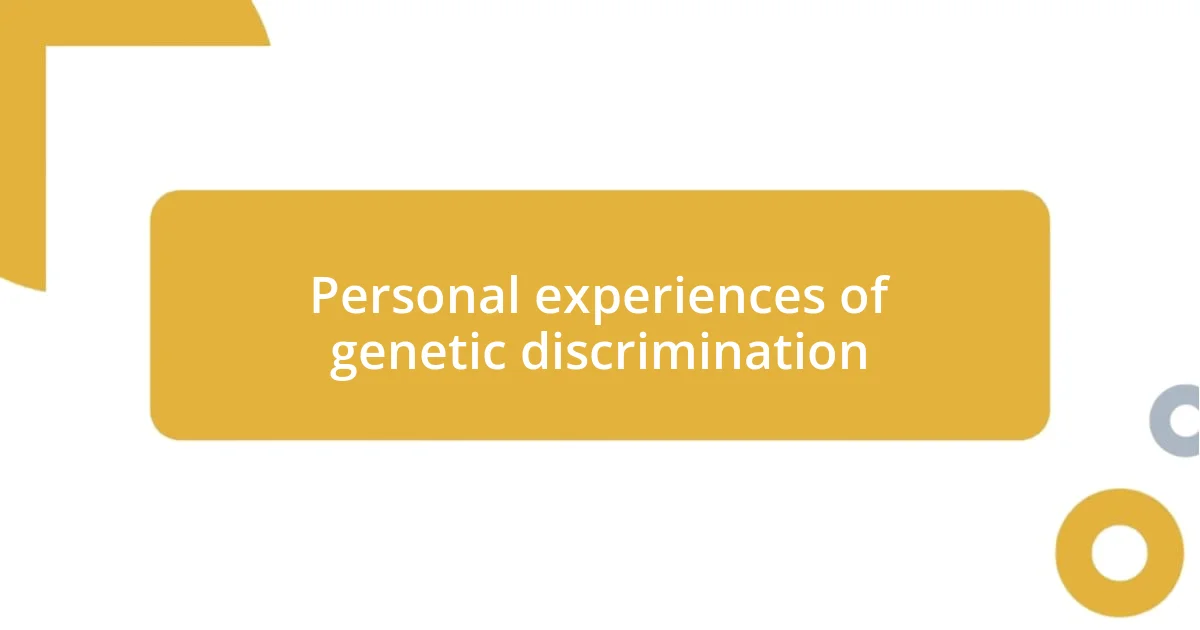
Personal experiences of genetic discrimination
I once attended a support group that specifically catered to individuals with genetic predispositions to chronic illnesses. Listening to their stories was eye-opening and heartbreaking at the same time. One woman shared how she was repeatedly overlooked for promotions because her employer was concerned about her potential health issues. I remember her voice breaking as she described the frustration of constantly proving her capabilities, all while feeling like she was being judged for something entirely out of her control.
In my own experience, I faced a subtle but clear form of genetic discrimination when I applied for health insurance. The agent mentioned a family history of a genetic condition, suggesting that I would face higher premiums even though I had no symptoms. This made me think about the broader implications of such decisions. Consider these realities:
- Career Advancement: People may miss out on job opportunities due solely to their genetic background.
- Insurance Challenges: High premiums or denial of coverage can stem from family genetic history, rather than individual health.
- Social Isolation: The fear of being unfairly judged can lead individuals to hide their genetic backgrounds, cutting them off from supportive communities.
These experiences truly highlight how genetic information can shape personal and professional lives in ways that feel deeply unjust.
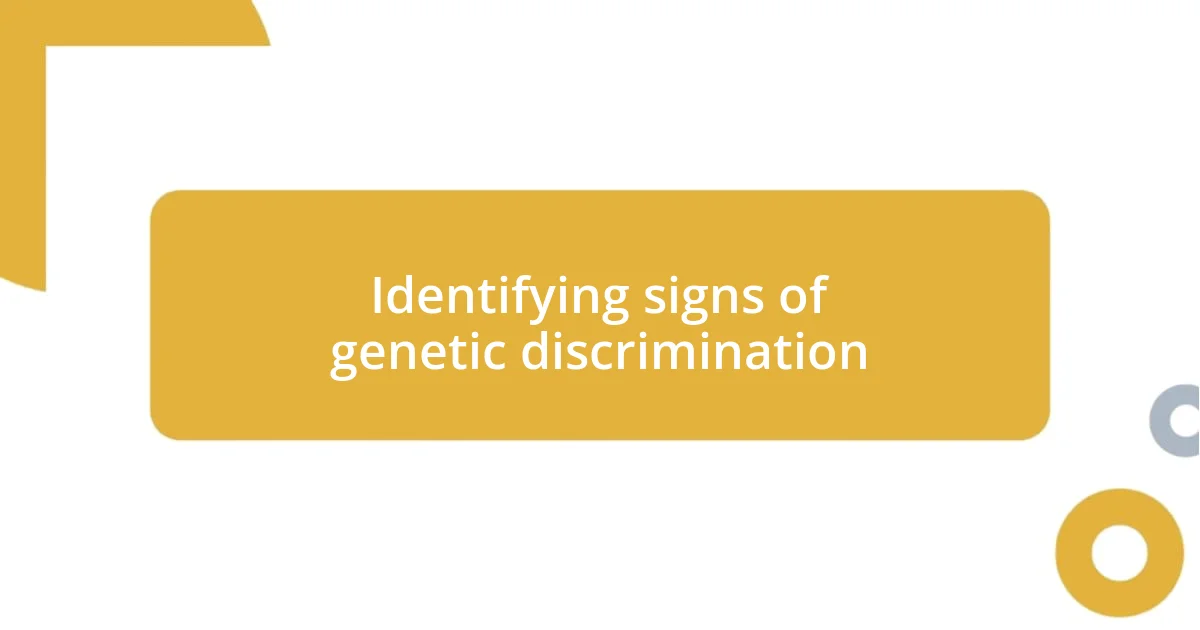
Identifying signs of genetic discrimination
Identifying signs of genetic discrimination can sometimes feel like navigating a minefield. One of the most subtle indicators is when a hiring manager asks probing questions about family medical history during an interview. I recall a friend who felt uneasy when prospective employers showed unusual interest in her family’s health background. At that moment, she suspected that her genetics were weighing more heavily on their judgment than her qualifications.
Another clear sign is the denial of health insurance or exorbitant premiums based on genetic predisposition. I recently spoke with someone who shared that after undergoing genetic testing for a hereditary condition, her insurance company hinted that her coverage would be significantly limited. This left her feeling vulnerable and anxious, as she realized that her very identity was being scrutinized through the lens of her genes.
Lastly, adverse treatment in the workplace can be a telling sign. I remember reading a story about an employee who received negative performance reviews despite consistently meeting targets, simply because she had a family history of potential health issues. It’s disheartening to witness how such discrimination affects not only careers but also self-esteem and mental health – individuals carry the weight of these biases long after the instance.
| Sign of Discrimination | Example |
|---|---|
| Job Interviews | Questions about family medical history |
| Health Insurance | Higher premiums based on genetic predisposition |
| Workplace Treatment | Negative reviews due to health family history |
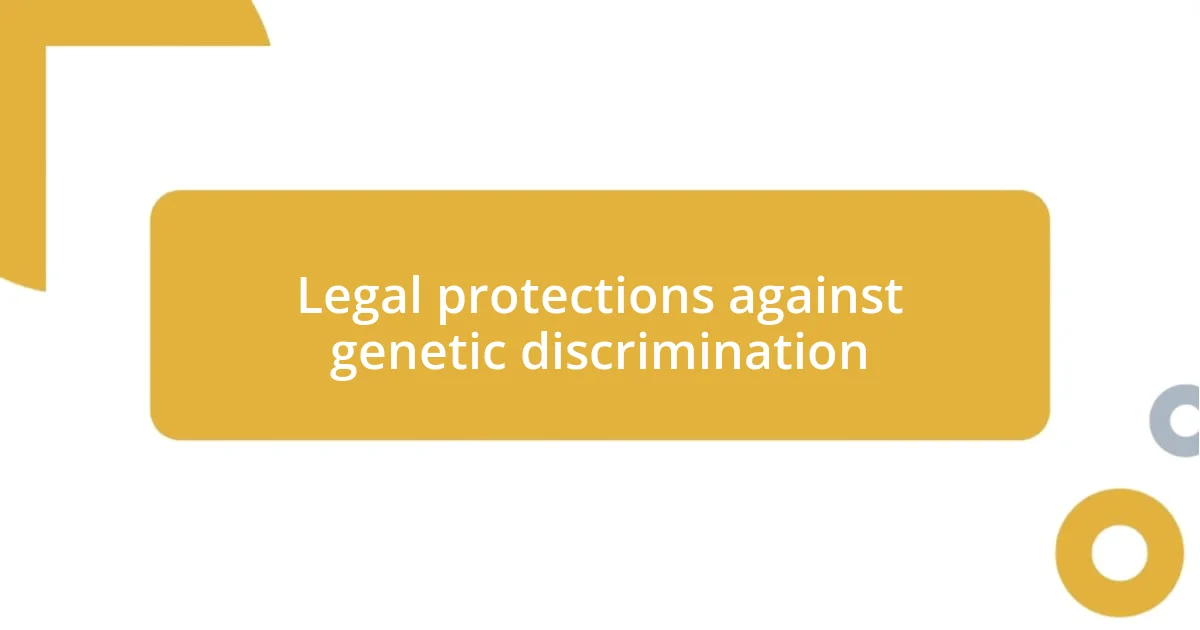
Legal protections against genetic discrimination
Legal protections against genetic discrimination are crucial in safeguarding individual rights. The Genetic Information Nondiscrimination Act (GINA) stands out as a key piece of legislation in the United States, preventing employers and health insurance providers from making decisions based on genetic information. It was an important step forward when I learned about GINA; knowing that this law could protect someone else from facing the same discriminatory hurdles I encountered brought me a sense of relief.
It’s important to note that while GINA provides significant protections, it doesn’t cover life insurance, long-term care insurance, or disability insurance. This gap in coverage can be concerning. For instance, I remember reading about a colleague who was denied life insurance purely based on her genetic predisposition to a certain condition, even though she was perfectly healthy. How is it fair that someone can be judged on genes they had no control over?
Additionally, many states have enacted their own laws to bolster protection against genetic discrimination, each with varying degrees of coverage and enforcement. I often think about how these local laws can directly impact individuals in different states. When you hear stories about someone being intimidated into silence due to the fear of discrimination, it becomes clear that awareness of legal protections is just as important as the protections themselves. Do we truly understand our rights in the intricate world of genetics? It’s a question that lingers for many of us navigating these challenges.
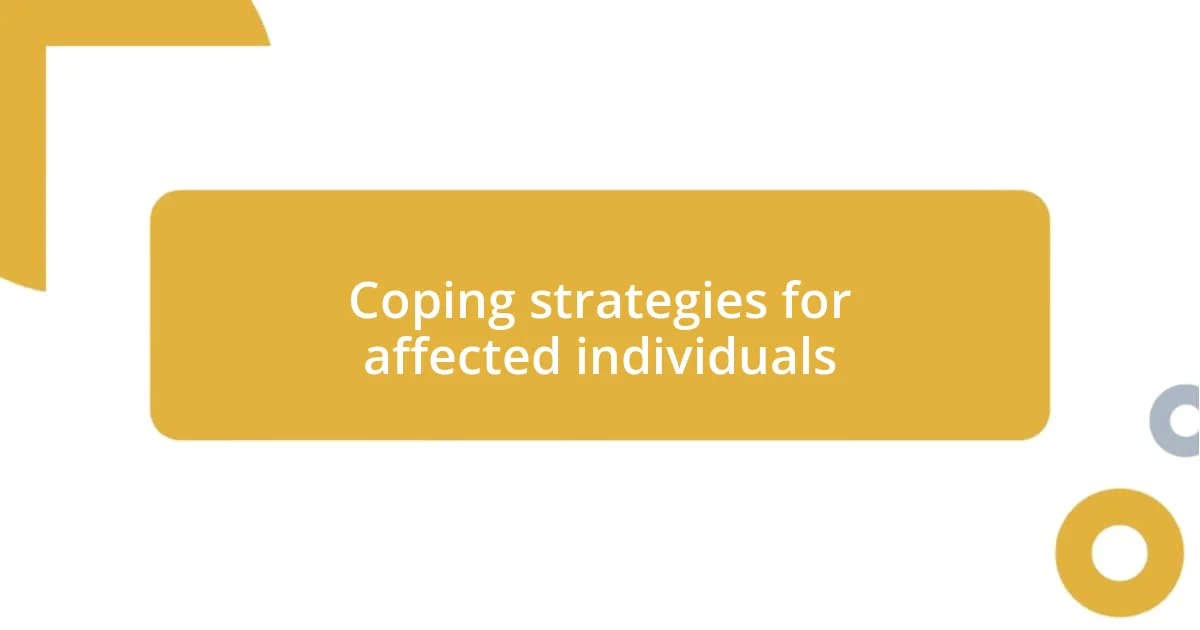
Coping strategies for affected individuals
Coping with genetic discrimination can be incredibly daunting. When I faced similar challenges, I found it helpful to connect with support groups where others shared their stories and strategies. These spaces fostered a sense of community and understanding, allowing me to realize I’m not alone in this journey. Isn’t it reassuring to know that there are others who truly understand your struggles?
Another effective strategy is to educate oneself about genetic issues and legal rights. I remember attending a workshop that focused on how to handle discrimination, which empowered me to advocate for myself. Armed with knowledge, I felt more confident challenging unfair treatment and discussing my rights with employers or insurers. Have you ever noticed how understanding your rights can transform your perspective?
Lastly, practicing self-care and fostering resilience plays a vital role in coping. I often turned to mindfulness techniques, such as meditation or journaling, which allowed me to process my emotions and build mental strength. It’s surprising how much clarity these small practices can bring. Have you ever paused to reflect on your emotions, only to discover newfound strength and resolve? It’s these moments that can help us navigate our unique journeys with greater ease.
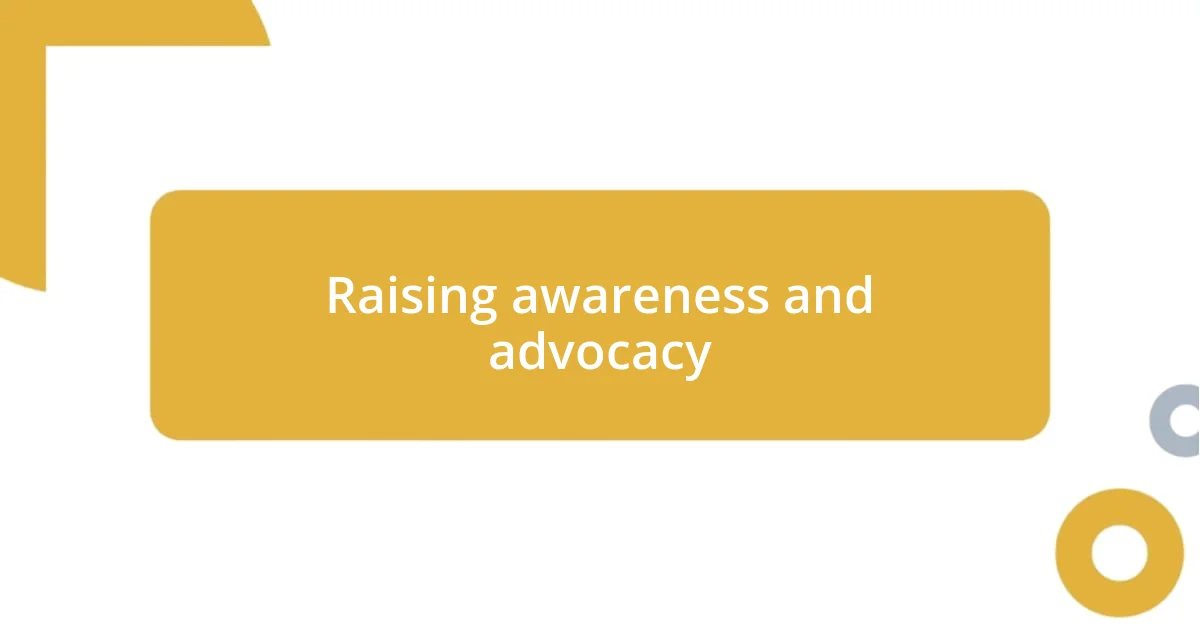
Raising awareness and advocacy
Raising awareness and advocacy is vital to combatting genetic discrimination and fostering a supportive environment. I recall volunteering at a local awareness campaign, where we distributed pamphlets about genetic rights. Witnessing individuals’ reactions when they learned about their legal protections was incredibly fulfilling. It’s moments like these that remind me: how can we expect people to advocate for themselves if they aren’t even aware of their rights?
Sharing personal stories can dramatically amplify awareness. I remember sharing my experience at a community forum, and the outpouring of support was overwhelming. Suddenly, individuals began sharing their own battles, revealing just how pervasive genetic discrimination can be. Isn’t it fascinating how vulnerability can foster connection and inspire action? It feels like every story shared is a step toward breaking silence and pushing for change.
Advocacy also requires collaboration with organizations that specialize in these issues. I often think about how impactful it is when we align our voices with established advocacy groups. When I joined forces with professionals focused on genetic discrimination, it felt like my experiences were validated and turned into a collective movement for change. How much more power do we have when we unite against a common challenge? Together, our stories can transform into a compelling call for action that resonates far and wide.
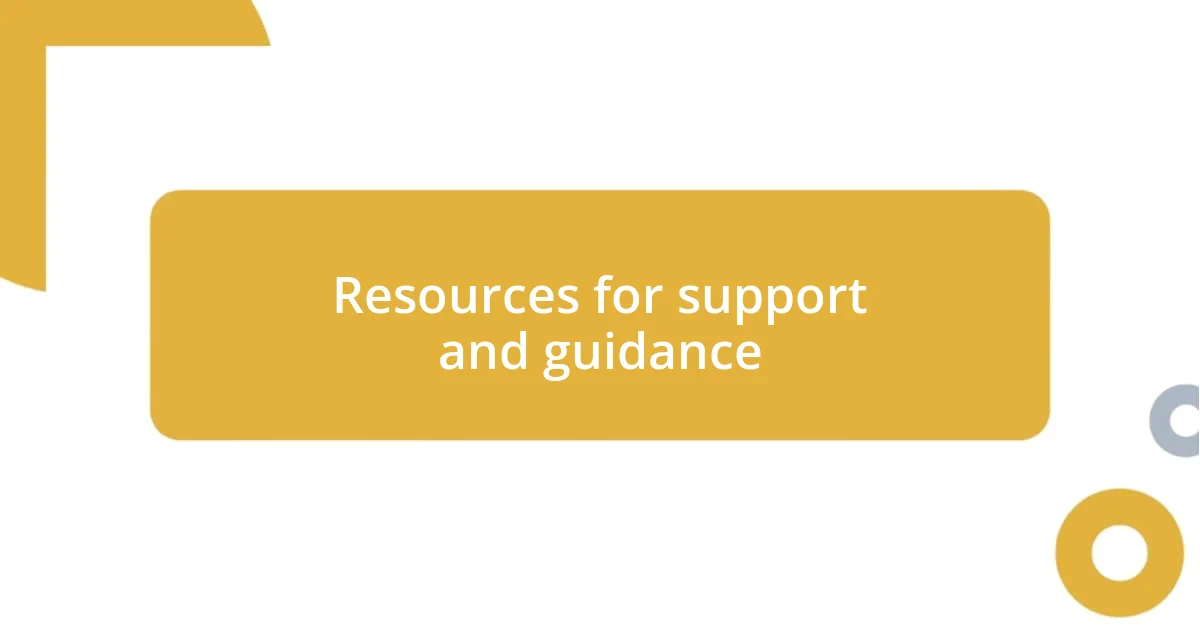
Resources for support and guidance
Finding resources for support and guidance is essential when navigating the often-challenging waters of genetic discrimination. I remember discovering a local nonprofit that specializes in this issue and excitedly attending their meetings. The facilitators were knowledgeable, providing invaluable information not just about legal rights but also practical advice for those affected. Can you imagine the relief of talking to someone who truly understands the intricacies of your situation?
Online forums can also be a treasure trove of support. I’ve spent late nights scrolling through threads where individuals shared resources and personal experiences about discrimination based on their genetic information. I often found myself feeling connected to people I had never met, each person offering insights or links to helpful articles and organizations. Have you ever searched for a community where you can be seen and heard; it makes the journey feel a little less isolating, doesn’t it?
Additionally, reaching out to genetic counselors can provide guidance tailored to your specific circumstances. I once had a session with a counselor who not only discussed my genetic tests but also helped me understand the potential implications of those results in the context of discrimination. It was eye-opening. How empowering is it to have someone in your corner, helping you strategize the best path forward? Those conversations can illuminate paths you never considered and connect you with resources that make a real difference.












